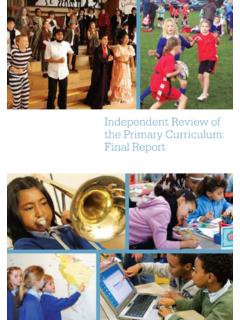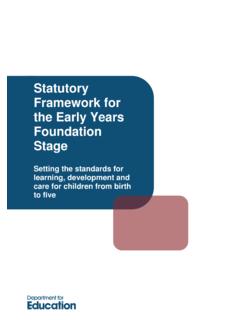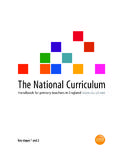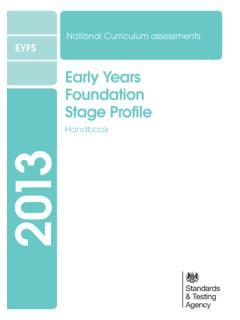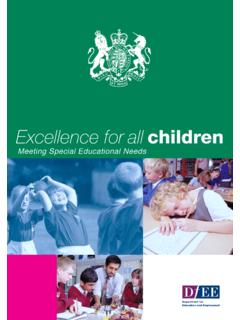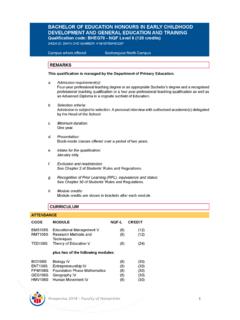Transcription of Primary Frameworks for literacy and mathematics …
1 Primary framework for Ref: 02011-2006 BOK-EN. literacy and mathematics Date-of-issue: 09-2006. Primary framework for literacy and mathematics Disclaimer The Department for Education and Skills wishes to make clear that the Department and its agents accept no responsibility for the actual content of any materials suggested as information sources in this document, whether these are in printed form or on a website. In these materials icons, logos, software products and websites are used for contextual and practical reasons. Their use should not be interpreted as an endorsement of particular companies or their products.
2 The websites referred to in these materials existed at the time of going to print. Tutors should check all website references carefully to see if they have changed and substitute other references where appropriate. The renewed Primary framework for literacy and mathematics marks another important step in our drive to raise standards and personalise learning so that all our children can achieve their full potential. Since 1998, much progress has been made by Primary schools in raising standards, drawing on the support of the National literacy and Numeracy Strategies.
3 However, despite the distance travelled national test results show progress is not being sustained across the board. We know more can be achieved and the framework provides a fresh momentum for securing progressive gains. It is critical not to lose the focus on Key Stage 1 in particular as this is the major milestone on the way to children being confident in literacy and mathematics by the time they leave their Primary schools. The renewed framework takes account of the significant developments that have taken place since the publication of the original Frameworks at the end of the 1990s and of the best practice seen in our most successful Primary schools, which is ensuring high achievement for all children.
4 The recommendations of the Independent review of the teaching of early reading the Rose Report and the central role of systematic phonics instruction are firmly embedded within the framework . The electronic structure will help teachers in their planning, improving access to the wide range of resources produced through the Primary National Strategy to support improvements to teaching and learning. It is in our Primary schools and Foundation Stage settings that curiosity and enthusiasm for learning is first nurtured and our children develop the confidence to read, to write and to calculate.
5 It is imperative that all our children develop these basic skills to sustain their learning and the confidence to access the curriculum as they move into secondary education. I am sure that the new Primary framework for literacy and mathematics provides teachers and practitioners with the tools they need in order to achieve this goal. Andrew Adonis Parliamentary Under-Secretary of State for Schools Contents Introduction 1. About the Primary framework 2. Six key areas that schools and settings are encouraged to consider 7. Improving learning and teaching 13.
6 The place of literacy and mathematics lessons 13. literacy and mathematics across the curriculum 13. Including all children 14. literacy 15. Strands of objectives 15. Speaking and listening 17. Early reading 18. Good literacy teaching 18. Planning 19. Mixed-age classes 20. literacy objectives 21. Core learning in literacy by year 21. Core learning in literacy by strand 39. mathematics 65. Strands of objectives 65. Good mathematics teaching 65. Planning 66. Mixed-age classes 67. Using and applying mathematics 67. Calculation 67. Calculators 68.
7 mathematics objectives 69. Core learning in mathematics by year 69. Core learning in mathematics by strand 87. Overviews of learning 103. The EYFS 103. Year 1 106. Year 2 111. Year 3 116. Year 4 121. Year 5 126. Year 6 131. In the electronic version of this document, each subsection has an overview of the intended audience, purpose and key messages Introduction Ambitions and challenges for the future The renewal of the Primary framework for literacy and mathematics offers everyone involved in teaching children aged from 3 to 11 an opportunity to continue the progress made in raising standards by embedding the principles of both Every child matters: change for children (2004) and Excellence and enjoyment.
8 Learning and teaching in the Primary years (0518-2004 G) into practice. Excellent teaching gives children the life chances they Enjoyment is the birthright of every child. The most powerful mix is the one that brings the two together. Children learn better when they are excited and engaged but what excites and engages them best is truly excellent teaching. Excellence and enjoyment: A strategy for Primary schools (ref: 0377-2003). The aim of the Primary framework for literacy and mathematics is to support and increase all children's access to excellent teaching, leading to exciting and successful learning.
9 There is a shared determination between the Primary National Strategy, schools, settings and local authorities (LAs) that all children are appropriately supported to make the progress of which they are capable. Children deserve: to be set appropriate learning challenges to be taught well and be given the opportunity to learn in ways that maximise their chances of success to have adults working with them to tackle the specific barriers to progress they face. The Primary framework for literacy and mathematics is designed to help practitioners, teachers, schools and settings achieve this ambition.
10 Primary framework for literacy and mathematics 02011-2006 BOK-EN . Primary National Strategy Crown copyright 2006. About the Primary framework The original Frameworks for teaching literacy and mathematics , which were introduced in the late 1990s, have contributed significantly towards raising standards and supporting improvements in teaching and learning in our Primary schools. Through a combination of greater guidance and continuing professional development (CPD) for teachers, the quality of teaching and consequently the quality of learning and achievement of children in literacy and in mathematics has improved.
